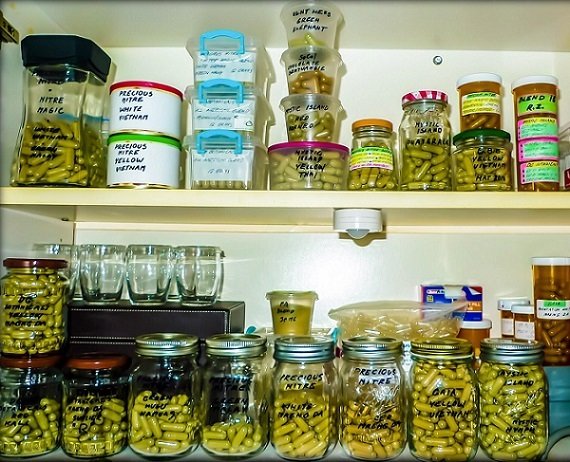Kratom has been used traditionally in folk medicine for more than hundreds of years. The plant has, however, recently found fame across the globe for its many medicinal and therapeutic properties. Since the substance is still new in this field, many people don’t know much about it, and many still find it hard to pronounce it. This article will clear up any misconceptions about Kratom, its pronunciation, definition, use, and effects.
What is Kratom?
Kratom, scientifically known as Mitragyna speciosa, is a medicinal herb. The evergreen Kratom tree belongs to the Rubiaceae family of flowering plants, commonly known as the coffee family. The word Kratom has Thai origins since the plant is native to the tropics of Southeast Asia including Thailand.
The plant is also found in Indonesia, Malaysia, Myanmar, Borneo, and Papua New Guinea.
Mitragyna speciosa was first described in 1839 by Pieter Korthals who was a Dutch colonial botanist. He was also the person who got the credits of naming the plant, which was renamed and reclassified several times before George Darby Havilland provided the final name and classification in 1859.
Kratom has been used traditionally since at least the nineteenth century by farmers, who chewed upon the dried leaves to get an energy boost to perform their daily physical duties. The leaves are dark green and glossy, and can grow to over 14–20 cm long and 7–12 cm wide (about the size of a man’s palm) when fully developed. Since the plant is generally found in tropical areas, it cannot tolerate cold weather and frost.
What are the different types of Kratom?
Kratom is mainly classified by either the colour of the vein that passes through the middle of the leaf or the area where it is cultivated. The three most commonly known Kratom leaves are;
- Red Vein Kratom
- White Vein Kratom
- Green Vein Kratom
- Yellow Vein Kratom (sometimes called Golden Kratom)
Red vein Kratom is best known for its sedative properties. The white strain is known for its energy boosting and stimulating effects, while the Green strain provides intermediate outcomes. Golden Kratom has a unique scent and higher level of certain alkaloids due to which it is more potent than the other strains.
Kratom strains classified according to the area cultivated, include;
- Indo Kratom (grown in Indonesia)
- Thai Kratom (grown in Thailand)
- Malay Kratom (grown in Malaysia)
- Borneo Kratom (grown on the island of Borneo)
How is Kratom pronounced?
There has been an ever going debate on how the word Kratom is pronounced. Many people pronounce it as Kray-tom, stretching the sound of the alphabet ‘a’. Others call it KRAH-tom, which is slightly different than the previous pronunciation as it contains the ‘ah’ sound, which although doesn’t exist in the English language, is found in most other languages. It can also be pronounced as Ketum (Key-tum or Keh-tum), where the sound of the alphabet ‘r’ is silent. This is believed to be the native way of pronunciation, used by Malaysian and Thai people.
Some people also call it Kra-Tome, Kray-Tome, or Krah-Tome, where Kra-Tome is considered English, Kray-Tome, American, and Krah-Tome as the local way of pronouncing it.
There is no ‘right’ way of Pronunciation though since different areas have different accents and therefore different ways of saying the same word. Many people, however, do argue that Kra-tum is the proper way of saying it, and should, therefore, be adopted by all Kratom users.
What are the effects of Kratom?
Kratom is used globally for its analgesic, anxiolytic and aphrodisiac properties. Its two main components, mitragynine, and 7-hydroxymitragynine resemble opiates in their functioning by acting on the opioid receptor system. The chemicals interfere with the standard pharmacology of the body by binding to the opioid, norepinephrine or serotonin receptors.
At low doses, Kratom is believed to deliver stimulating effects, but increasing the dosage accentuates the sedating properties of the plant. The substance is used extensively by people who want to find relief from chronic pain, anxiety, depression, stress, muscle ache, cramps, and seizures.
It also helps relieve opiate withdrawal symptoms and is used for its mood lifting and euphoric properties.
Effects may also include a boost in energy, talkativeness, increased confidence and increased levels of concentration and focus.
Is Kratom legal?
Until recently, Kratom was considered a potentially harmless drug, which was sold all over the globe without any strong regulations. This concept has been changing lately because of the growing international concern about the possible threats to public health from Kratom use.
Withdrawal symptoms are among the most significant risks, which include conditions such as anorexia, insomnia, weight loss, muscle spasms, muscle ache, hot flushes, fever, decreased appetite, and diarrhoea.
In 2014, FDA banned imports and the manufacturing of Kratom as a dietary supplement due to the fear of drug abuse, addiction, and dependence. 16 countries, including Thailand, Malaysia, Australia, Finland, and Denmark have stated Kratom as a controlled substance.
User’s opinions about Kratom pronunciation
Just like the plant itself, the pronunciation of Kratom is also very controversial. Many people believe that it is very embarrassing when you call it with the wrong name, and therefore they often end up searching the internet for the right pronunciation.
A lot of people on Reddit asked for help regarding Kratom and its pronunciation, saying that they feel unsure whether they are calling the substance with its proper name.
One user commented ‘I use the long “a” version Kray-tom. I’ve heard others use the hard “a” pronunciation Krat-tom, and I am curious as to how it is pronounced”.
Another user commented ‘I would believe K-rah-tom to be the proper English pronunciation. I always imagine people who pronounce it “k-ray-tom” to have a deep southern American accent’. It was seen that the majority of people were confused between Kray-tum and Kratom, but there were so many contradicting views that no one could come to a final decision.
Many users, therefore, suggested that pronunciation didn’t matter, since everyone comes from a different region, and has different accents. The only thing that matters is that one should be able to convey their message.
A user commented ‘In the beginning, I always pronounced it “Krah-tom” but then kept hearing everybody say “Kray-tom”, so I figured it was possible I was saying it wrong. But when it comes down to it, who cares? As long as we all can communicate our thoughts properly what does it matter?”
Conclusion
Since nobody knows how Kratom is pronounced, it is always better to accept the way other people say the word instead of rudely correcting them because who knows, it might as well be you who is saying it wrong, and you don’t want your grammar obsession to backfire, do you?








